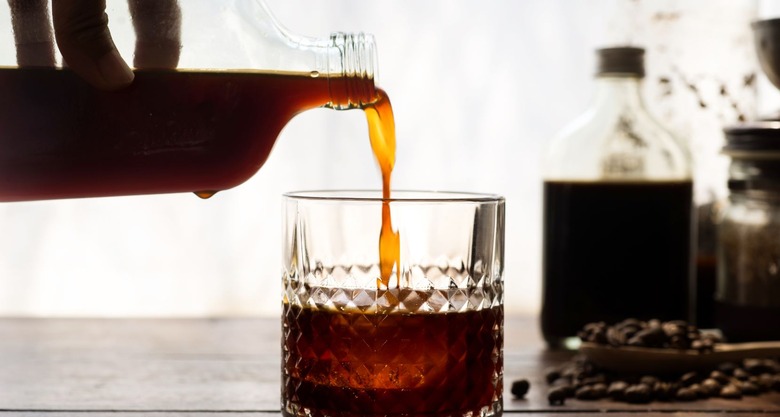Your Cold Brew Coffee Might Have A Lot More Caffeine Than You Think
If you've ever cracked open a bottle of cold brew and downed it like any other iced coffee, you've probably noticed that the resulting caffeine buzz is far more substantial than what you probably expected. And that's no fluke: Cold-brew coffee, the super-trendy alternative to standard iced coffee, has far more caffeine than your usual hot-brewed coffee.
Cold brew coffee is made using processes that aren't too different from how hot-brewed coffee is made — either by fully immersing the ground coffee in water or using a drip system. But because cold brew is made using water at room temperature (as opposed to about 200 degrees for hot coffee), the process is much slower, taking up to 24 hours in some cases.
Room temperature water extracts fewer water-soluble flavors from the coffee (which is why cold brew coffee is prized for its lack of bitterness), but there's one thing it doesn't extract less of: caffeine. In fact, the slow process extracts more caffeine than traditionally-brewed coffee.
Many cold brews are sold as concentrates, which allows you to add water to your liking and make the caffeine amount comparable to regular iced coffee. But plenty of coffee companies, like Stumptown and Chameleon, sell cold brew in ready-to-drink bottles. Stumptown's 10.5-fluid-ounce bottle contains 279 milligrams of caffeine, and its 11-ounce nitro cold brew bottle contains 330 milligrams; Chameleon's 10-ounce ready to drink cold brew bottle contains 270 milligrams of caffeine. For comparison's sake, an average eight-ounce cup of coffee contains anywhere from 95 to 165 milligrams of caffeine, and a 12-ounce can of Red Bull contains 111 milligrams.
If you want to learn how to make your own cold brew, you can find a recipe here, but you might not want to drink the whole thing in one sitting!
